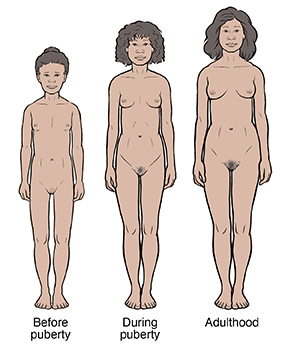A
B
C
D
E
F
G
H
I
J
K
L
M
N
O
P
Q
R
S
T
U
V
W
X
Y
Z
Click a letter to see a list of medical procedures beginning with that letter.
Click 'Back to Intro' to return to the beginning of this section.
Puberty: Normal Growth and Development in Girls
Your child has reached the stage of adolescence called puberty. During this stage, your child’s body begins to develop and become sexually mature. The information below explains what to expect during this stage of your child’s growth and development.
How long does puberty last?
In girls, puberty usually starts between ages 9 and 14. Once it begins, it lasts about 2 to 5 years. But every child is different. And there's a wide range of what's normal. Your child may begin puberty a little earlier or later and finish sooner or later than their friends. If you have questions or concerns about your child’s development, talk to their healthcare provider.
Physical changes during puberty

Reassuring your child
-
Your child may be concerned that their peers are more or less developed than they are. Explain to your child that kids of the same age may be at different stages of puberty. Your child’s growth, whether slow or fast, is happening at the right rate for them.
-
Help your child adjust to their changing body. Offer solutions for body odor and acne (such as bathing more often, using deodorant, and using acne products).
-
Your child will likely feel uncomfortable talking about sexual changes with you. Let them know you're there to talk to. You may also think about giving your child a book with information about puberty that they can read on their own.
Exams during puberty
As puberty begins, it’s important for your child to see their healthcare provider once a year. Keep bringing her in for regular health screenings, at least once a year. Know that, during puberty, health screenings will include an exam of your child without clothes. This lets the healthcare provider see how your child is progressing physically through puberty. Reassure your child that this exam is normal and expected. Also, parents may be asked to leave the room for part of the exam. This is so the child and the healthcare provider can have an honest and open discussion. If you have any questions or concerns, talk to your child’s healthcare provider.
Online Medical Reviewer:
Amy Finke RN BSN
Online Medical Reviewer:
Dan Brennan MD
Online Medical Reviewer:
Rita Sather RN
Date Last Reviewed:
10/1/2024
© 2000-2026 The StayWell Company, LLC. All rights reserved. This information is not intended as a substitute for professional medical care. Always follow your healthcare professional's instructions.